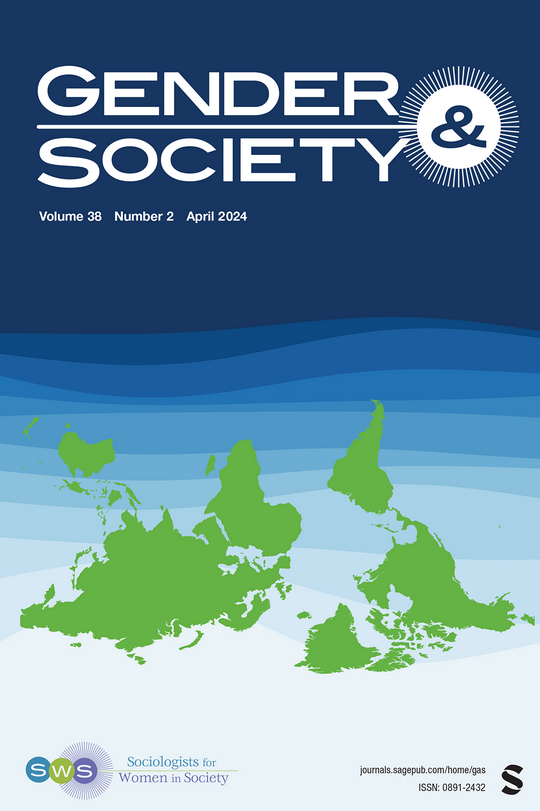局外人豁免:韩国的跨性别移民和性别责任
IF 3.4
1区 社会学
Q1 SOCIOLOGY
引用次数: 0
摘要
“行为性别”在不同的语境下被探讨。然而,对性别问责的研究不足,导致学者们呼吁开展工作,分析性别问责的不同突出程度。作为回应,我研究了来自西方和东南亚、现在生活在韩国的跨性别者和性别不符合者(TGNC+)。TGNC+移民如何在韩国和原籍社会中对性别、种族/民族、阶级和国籍边界负责?我发现TGNC+移民在韩国感到比在他们的原籍社会更安全——包括那些可能被传统上认为比韩国更进步的社会——以肯定的方式“做性别”。原因是医疗服务很少有把关,公共空间有利于TGNC+移民的性别肯定,因为他们比韩国同龄人更少对性别负责。因此,我称他们为豁免外人。被豁免的外来者很少对性别负责,因为他们的“外来者”身份,受国籍、阶级和种族/民族的影响,取代了性别,成为他们与韩国“内部人”互动时划定界限的主要框架。通过将性别问责的文献与边界研究相结合,我强调了当TGNC+个体在不同的社会背景下迁移和互动时,性别、国籍、阶级和种族/民族的显著性变化。我指出了在法律上不被视为lgbtq友好的目的地,TGNC+移民在哪些条件下可以肯定性别认同。我进一步区分了他们作为豁免外来者的结构影响韩国TGNC+移民的不同方式,包括他们在当地权力等级中的交叉位置,如国籍、阶级和种族/民族。本文章由计算机程序翻译,如有差异,请以英文原文为准。
OUTSIDER EXEMPTION: Transgender Migrants and Gender Accountability in South Korea
“Doing gender” has been explored in a variety of contexts. However, accountability to gender is understudied, leading scholars to call for work that analyzes the varying salience of gender accountability. I respond by studying transgender and gender-nonconforming (TGNC+) migrants originally from the West and Southeast Asia who now live in South Korea. How do TGNC+ migrants experience accountability to gender, race/ethnicity, class, and national origin boundaries in Korea and origin societies? I find that TGNC+ migrants feel safer in Korea than in their origin societies—including those that may be conventionally considered more progressive than Korea—to “do gender” in affirming ways. The reasons are that medical care is rarely gatekept, and public spaces facilitate gender affirmation for TGNC+ migrants because they are held less accountable to gender than their Korean peers. For this reason, I call them exempt outsiders . The exempt outsider is rarely held accountable to gender because their “outsider” status, inflected by national origin, class, and race/ethnicity, displaces gender as the primary frame through which boundaries are drawn in their interactions with Korean “insiders.” By integrating the literature on gender accountability with boundary studies, I highlight the shifting salience of gender, national origin, class, and race/ethnicity when TGNC+ individuals migrate and interact in different social contexts. I identify what conditions enable gender identity affirmation by TGNC+ migrants in a destination that is not regarded as legally LGBTQ-friendly. I further distinguish the different ways in which their construction as exempt outsiders affects TGNC+ migrants in Korea in terms of their intersectional placement in local power hierarchies, such as national origin, class, and race/ethnicity.
求助全文
通过发布文献求助,成功后即可免费获取论文全文。
去求助
来源期刊

Gender & Society
Multiple-
CiteScore
9.70
自引率
3.60%
发文量
78
期刊介绍:
Gender & Society promotes feminist scholarship and the social scientific study of gender. Gender & Society publishes theoretically engaged and methodologically rigorous articles that make original contributions to gender theory. The journal takes a multidisciplinary, intersectional, and global approach to gender analyses.
 求助内容:
求助内容: 应助结果提醒方式:
应助结果提醒方式:


